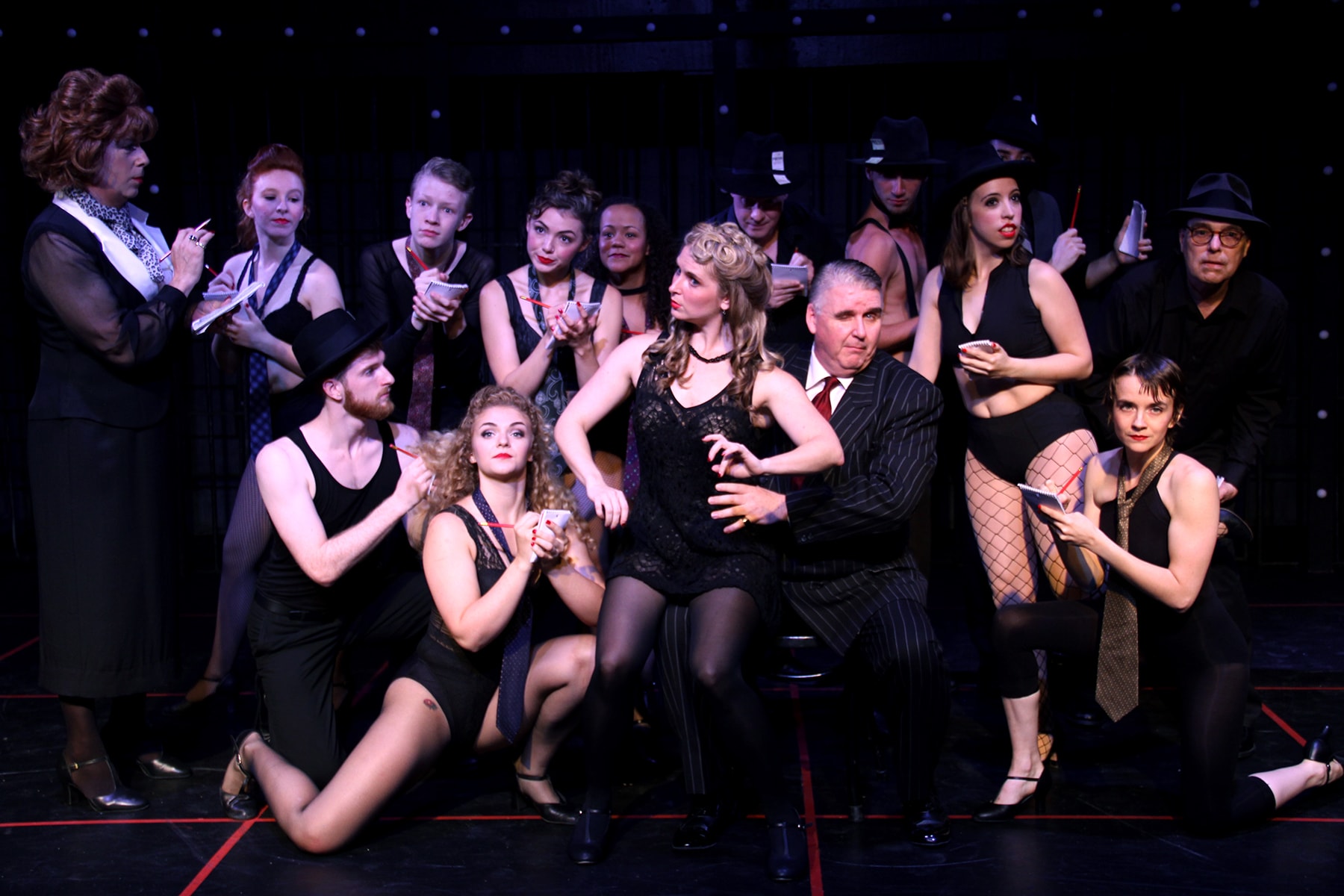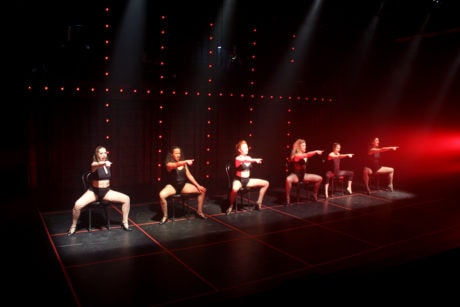Chicago, now running at Other Voices Theatre in Frederick, has a long and winding history. In 1924, Chicago reporter Maurine Watkins covered the sensational trials of Belva Gaertner and Beulah Annan, each of whom had killed a lover under colorful circumstances, been represented by prominent lawyers, and been acquitted. Watkins went to New York, studied playwriting, and by 1926 created the Broadway comedy Chicago, in which the murderers became Velma Kelly and Roxie Hart, respectively (the details of Roxie’s story closely followed Annan’s).

In 1942, Roxie Hart, a movie starring a tap-dancing Ginger Rogers, greatly revised the story; in the Production Code era, it had to be Amos who was the actual killer. The movie was not a success, but Gwen Verdon saw it on TV in the 1960s, and she and her husband, Bob Fosse, became interested in basing a musical on the story. Watkins resisted, but after she died in 1969, her estate made the rights available.
Fosse and Verdon enlisted John Kander and Fred Ebb to write the music and lyrics (Fosse and Ebb collaborated on the book) of what became 1975’s Chicago: A Musical Vaudeville. Despite the star power of the original cast (Verdon as Roxie, Chita Rivera as Velma, and Jerry Orbach as Billy), and Fosse’s dynamic, erotically edgy choreography, the musical had only moderate success, being overshadowed by A Chorus Line, which swept the Tony Awards for musicals that year. The production received mixed reviews, many of which criticized the show for being excessively dark, vulgar, and cynical.
In 1996, Anne Reinking and Bebe Neuwirth starred in a highly successful, long-running revival (Joel Grey played Amos), which pared down the original fully-staged production to near-concert-version simplicity. The world had changed since 1975, not least in a proliferation of sensational, televised trials, above all O.J. Simpson’s. (I saw a Las Vegas production of the revival in the late 1990s, in which an African-American actor played Billy essentially as Johnnie Cochran). As one critic noted, “what was cynical [in 1975] is now au courant.”
Now another 20+ years have passed, and what once seemed overly dark cynicism, and then a parallel to current events, has become almost a matter of nostalgia. In a time marked by terrorism and repeated mass shootings, Chicago may respond, in ways not imagined by its authors, to a need to Make Murder Fun Again.
The Other Voices production retains all the cheeky vaudevillian fun of the piece, never more than in “We Both Reached for the Gun,” in which lawyer Billy Flynn (Steve Cairns) manipulates Roxie (Michelle Boizell) like a ventriloquist’s dummy, their mouths in perfect synchronization as they spin their made-up tale of the murder. In fact, with the exception of “Class,” in which Velma (Alyssa Little) and Mama Morton (La Tasha Do’zia-Earley) converse, in humorously vulgar terms, about the eclipse of manners in 1920s Chicago, all the songs in the show are presentational vaudeville numbers.
Velma had been a vaudeville performer until she killed her sister, her partner in a dual act. In Little’s well-danced “I Can’t Do It Alone,” Velma unsuccessfully tries to enlist Roxie to replace her deceased partner. Roxie aspires to a vaudeville career, which she imagines in “Roxie” and finally achieves, with Velma, in “Nowadays.” In both songs, Boizell’s movement excels. For Billy, law is all about showbiz, as his “All I Care About is Love” and “Razzle Dazzle” – abetted by the women’s dance ensemble, complete with black and white showgirl feathers in the former – amply demonstrate. Even Amos (Lee Hebb), dim schlub that he is, gets a delightful Al Jolson moment in his “Mr. Cellophane,” one of the show’s highlights. Completing Chicago’s the law=showbiz=the media triad, J. Douglas is fully vaudevillian in the drag role of sob sister Mary Sunshine, using her well-trained soprano (just see the program bio) to excellent effect in “A Little Bit of Good.”
Director Susan Thornton made a laudable and, in terms of present-day theater practice, somewhat brave choice in electing not to body mic the cast. This has the benefit of allowing voices to be heard from where actors are actually located on stage and letting the audience enjoy the unmediated sounds of the strong voices in the full ensemble numbers and particularly in the solo work of Cairns and Do’zia-Earley; her belt in “When You’re Good to Mama” easily carries to the back of the house. Thornton’s choice pinches in the cases of Velma and Roxie, whose good but smaller voices do not carry as fully. For example, once Velma discarded her hand-held mic in the opening “All That Jazz,” her words became more difficult to make out. The same was true of some of the Merry Murderesses’ spoken lines in “Cell Block Tango.” Music director Zane Oberholzer and his band do a masterful job in conveying Kander’s jazzy score while generally keeping the volume in balance with the unamplified singers.
From the musical’s beginnings, dance has been a key element of Chicago, and not only Velma and Roxie, but also the male and female ensembles, acquit themselves well throughout the production. One noteworthy movement bit is Lizard Walker’s aerial “Hungarian Rope Trick.” Donna B. Grim’s choreography shows its debt to Fosse’s, but does not attempt to replicate it. More sinuous than angular, it keeps the sexiness that the show needs but with less of the transgressive quality that was the mark of Fosse’s work.

Doing double duty, Lee Hebb designed the mostly black set, with red grid marks on the floor and backed by a two-story prison structure, with vertical and horizontal rows of LED bulbs between the cells. The band occupies the upper level, safely behind bars; the cells of the Merry Murderesses the lower. For “Cell Block Tango” the cell block doors slide open, to a good metallic sound effect. The design makes a significant contribution to the mood of the show.
In addition to the lights attached to the set, which begin as red and change color from time to time, Steve Knapp’s lighting design is strong on adding color to the proceedings. There are times, however, when actors are momentarily in shadow, as when the downward-pointing specials at the front of the stage do not precisely align with the actors in “Cell Block Tango.” Costumes (Maria Boyce, Patty Byrne, Nancy Speck) mostly follow the basic black dance costume concept featured in the 1996 revival, with occasional upper body accents like Velma’s and Roxie’s white jackets in “Nowadays.” Roxie’s goofily dowdy dress for the trial scene is great fun, as is Mary Sunshine’s outfit. Billy wears a natty suit; Amos’s suit, unsurprisingly, is anything but natty. There was a nice use of circus props in “Razzle Dazzle.”
Chicago uses the deceptions of show business as a metaphor for life. At the end of the show, Velma and Roxie thank the audience for its belief in their innocence as they offer flowers. They are life’s winners; Hunyak (the prisoner who insists on being “not guilty”) and the hopelessly sincere Amos are the losers; and the audience enjoys its complicity. At one point, Velma says “You know, a lot of people have lost faith in America . . . but we are living examples of what a wonderful country this is.” Or as the bailiff intones in the trial scene, “Blah, blah, blah, blah…truth, truth, truth.” If one of the marks of a classic is to speak to a changing world over time, then Chicago, now in its fifth decade, contends for classic status in speaking to today’s world in which, at the highest levels, “reality show” performance dominates and truth is disdained. Other Voices’ production shares that insight while being, of course, highly entertaining showbiz.
Running Time: Two hours and 18 minutes, including a 15-minute intermission.
Chicago plays at Other Voices Theatre, 244B South Jefferson Street, Frederick MD. For tickets, call the box office at 301-662-3722, or go online.




